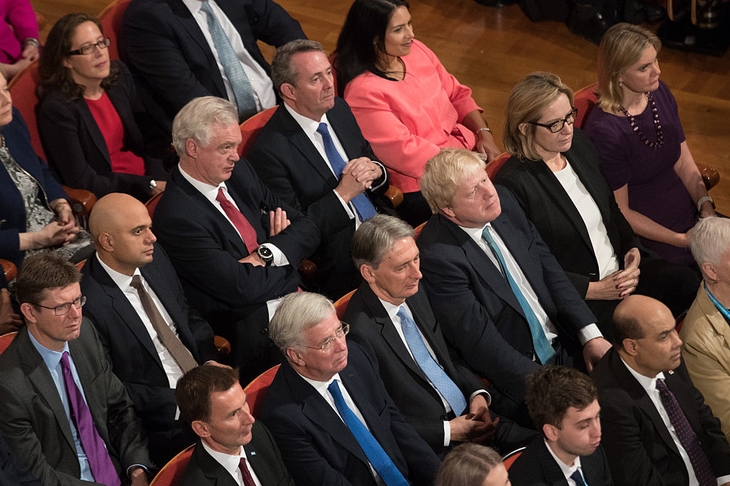Jeremy Corbyn used to be a punchline at the Conservative party conference. Tories believed that his election as Labour leader guaranteed them electoral success. But the picture that emerged from this year’s conference is of a Tory party that is desperately trying to work out how to counter Corbyn, and how to win a fourth term in office — something that even New Labour couldn’t achieve.
Senior Tories now recognise that the questions Labour are asking deserve a response. In his conference speech, Philip Hammond acknowledged that people feel ‘that they are working for the system but the system isn’t working for them’.
And on the fringe, various Tories set out their own answers to Corbyn. Liz Truss, the Chief Secretary to the Treasury, is the cabinet minister who has taken up this challenge with the greatest gusto. She has been arguing that the answer to the Tories’ problems is economic liberation. She wants tax cuts, a ‘day zero’ approach to the size of the state and planning reform so that more houses can be built.
The cabinet ministers who don’t agree with Truss argue that her approach is all a bit 1980s. They prefer to emphasise the need to reform capitalism rather than reinvigorate it. But the Tories agree on more than they realise. Most recognise that the best way to deal with over-mighty companies is through more competition. Indeed, the problem with rail privatisation is that it lacks a competitive element. The train franchises are, essentially, private monopolies and there is little reason why a private sector monopoly should be superior to a public sector one.
Another thing the Tories increasingly agree on is the need to build more homes, even if this means building on parts of the green belt. One cabinet minister tells me that he suggested this to a group of Tory councillors, expecting to have his head bitten off, only to find them agreeing with him. Tellingly, the first policy in Boris Johnson’s alternative manifesto was to build more houses.
Theresa May might have declared last year that her mission was to be the prime minister who fixed the housing crisis, but the steps the government is taking clearly aren’t enough. The Tories must dramatically up the pace, for the party’s electoral future as much as for anything else. As the party now recognises, those without capital cannot be expected to be capitalists.
Finally, the Tories need to rediscover their ability to talk about education and welfare. During the Cameron years, they talked confidently on these topics. But even as Labour threatens to undo the progress of the Cameron years, the Tories are still hesitant about discussing these subjects.
If the fringe events focused on what the response to Corbyn should be, the private conversations which took place were on who should deliver it. There isn’t unanimity about when the next Tory leadership contest will be, but many — including several cabinet ministers — think it will take place before next year’s conference. Even normally loyal cabinet ministers admit that a domestic agenda that can command attention will require a new leader.
Various MPs emerged as possible contenders during conference. Dominic Raab gave a grown-up speech reminding the audience that there were good people — and good arguments — on both sides of the Brexit divide. He showed how someone who was a leaver, but not the face of the campaign, could be well suited to the job of reuniting the country after Brexit. He also spoke about how his father had fled the Nazis in 1938 and how many of his relatives had died in the Holocaust. He said that this was why he was so determined to fight Corbyn, with his lax attitude to anti-Semitism, until the hard left was driven back to the margins of politics.
Raab is by no means the front-runner. Many Tories still worry that he needs to show a softer side and that he is too reliant on a classic right-wing policy agenda. One of those who used to work in Cameron’s No. 10 observed that Raab needs his own Steve Hilton. This was a reference to the way in which Hilton presented Cameron as a different kind of Tory, one who cared about the environment, the NHS and his work/life balance.
Other than the Prime Minister, the person under the most pressure this week was Sajid Javid. The Home Secretary is the new Tory leadership front-runner, which is always a dangerous place to be. He isn’t a natural orator, but his speech was well crafted and reasonably delivered. He did his chances no harm.
Jeremy Hunt, the Foreign Secretary, had a tricky few days. He had been emerging as the establishment leadership candidate. But his warning that the EU mustn’t behave like the Soviet Union in the Brexit negotiations has gone down badly with many of his natural supporters.
Corbyn’s agenda is oddly nostalgic. He talks about Britain as if it was better in the 1960s than it is today. This creates an opportunity for the Tories to be the optimists, to be the ones talking about how technology can — and will — make life better. Interestingly, Health Secretary Matt Hancock used his speech to laud the changes that technology is bringing to healthcare and to argue that the Tories ‘must embrace the future or embrace defeat’.
Conference season normally sets the tone for the political events of autumn. But this year, Brexit will dominate the upcoming months. The focus of the next fortnight will be the October European Council, before the special November summit begins. If there is a withdrawal agreement, it will then have to make its way through parliament. But whatever happens with Brexit, if the Tories want to win another election, they need a compelling domestic agenda that looks beyond Britain’s withdrawal from the EU. Whoever wishes to succeed Mrs May will have to provide this.







Comments